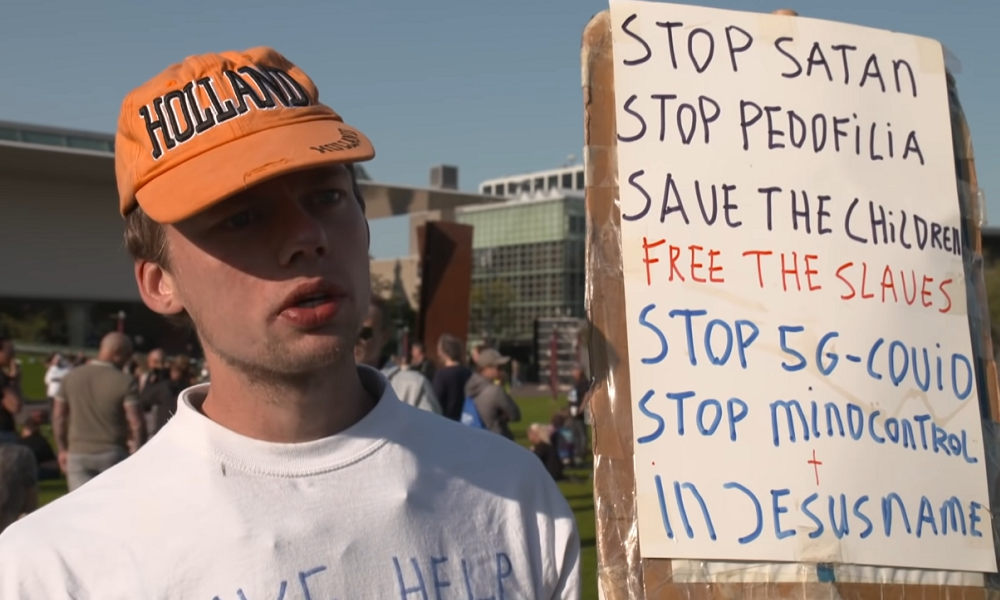Politics
Dutch intelligence agency warns conspiracy theories pose ‘serious threat’

Conspiracy theories which claim the government, journalists and scientists are controlled by a “small, evil elite” pose a “serious threat” to the democratic rule of law, the Dutch Intelligence agency warned Monday.
In its annual report, the General Intelligence and Security Service (AIVD) described anti-institutional extremism as a long-term threat against democracy, considering that false messages continue to spread and adapt to current events.
“Initially they focused mainly on coronavirus measures. After most of those were abolished, the number of followers temporarily declined,” the agency said. “The climate crisis, nitrogen emissions and the war in Ukraine are now being discussed more and those who spread the theories are gaining support again.”
Conspiracy theories often focus on the idea that a small, evil elite controls not only the government but also the legal system, the news media and science. The Great Reset, which is often linked to the World Economic Forum, QAnon, 15-Minute City and the New World Order are well-known conspiracy theories.
“This elite is supposedly seeking to impose a totalitarian surveillance state and wishes to suppress Dutch people, make them slaves or even kill them,” the report said. “This elite allegedly stages events and phenomena to justify increasing control, such as the coronavirus pandemic, the nitrogen crisis and the war in Ukraine.”
The Dutch intelligence agency estimates that more than 100,000 people in the Netherlands are followers of anti-institutional conspiracy theories.
“The followers of this narrative say they live in occupied territory and are at war with the elite,” the agency said. “They say people who are part of the elite should be arrested, tried in tribunals and according to some should be executed.”
The report notes that followers of those conspiracy theories are generally not calling for violence but their choice of words – being “at war” with an enemy – could inspire some people to carry out attacks. Last year, a man was arrested for allegedly plotting to kill Dutch Prime Minister Mark Rutte.
“Secondly, the continued spread of false and hostile messages can lead to such distrust in (the legitimacy of) ministers, members of parliament, judges, police officers, journalists and scientists that it hinders their work,” the report said. “Such undermining of democratic institutions, combined with widely shared distrust and disengagement of citizens, could threaten the democratic rule of law.”
Followers of conspiracy theories do not necessarily want to get rid of democracy, government, media or science as a whole, but they want to change how it is run, with some seeking a parallel society with its own shadow government and currency.
Dutch politician Thierry Baudet, the leader of the Forum for Democracy (FVD) party, has been accused of repeatedly spreading misinformation in recent years. He embraced the label conspiracy theorist in an interview late last year.
“I’m a conspiracy theorist. I believe that we are being governed by a global conspiracy of evil reptiles,” the politician said. His party has also advocated for the creation of ‘Forumland,’ a parallel society with its own currency and schools.

-

 World6 days ago
World6 days agoEthiopian volcano erupts for first time in thousands of years
-

 Legal3 days ago
Legal3 days agoUtah Amber Alert: Jessika Francisco abducted by sex offender in Ogden
-

 US News2 days ago
US News2 days agoExplosion destroys home in Oakland, Maine; at least 1 injured
-

 Health3 days ago
Health3 days agoMexico’s September human bird flu case confirmed as H5N2
-

 Legal1 week ago
Legal1 week agoSuspect in San Diego stabbing shot by authorities after fleeing into Mexico
-

 Health1 week ago
Health1 week agoMarburg virus outbreak in Ethiopia grows to 6 confirmed cases
-

 World1 week ago
World1 week agoU.S. sanctions companies and vessels accused of aiding Iranian military oil sales
-

 World3 days ago
World3 days agoWoman killed, man seriously injured in shark attack on Australia’s NSW coast



